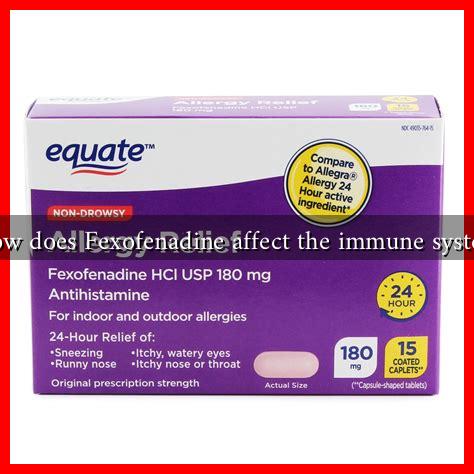-
Table of Contents
How Does Fexofenadine Affect the Immune System?
Fexofenadine is a widely used antihistamine primarily prescribed for the treatment of allergic conditions such as hay fever and chronic urticaria (hives). As a second-generation antihistamine, it is known for its ability to alleviate allergy symptoms without causing significant sedation. However, its impact on the immune system is a topic of ongoing research and discussion. This article delves into how fexofenadine interacts with the immune system, its potential effects, and the implications for individuals with allergies or other immune-related conditions.
Understanding Fexofenadine
Fexofenadine is a selective antagonist of peripheral H1 receptors, which means it blocks the action of histamine—a chemical released during allergic reactions. By inhibiting histamine’s effects, fexofenadine helps reduce symptoms such as sneezing, itching, and runny nose. Unlike first-generation antihistamines, fexofenadine does not readily cross the blood-brain barrier, minimizing sedative effects.
Mechanism of Action
The primary mechanism of fexofenadine involves:
- Histamine Receptor Blockade: Fexofenadine binds to H1 receptors on target cells, preventing histamine from exerting its effects.
- Reduced Inflammatory Response: By blocking histamine, fexofenadine may also reduce the overall inflammatory response associated with allergic reactions.
- Impact on Other Immune Mediators: Some studies suggest that fexofenadine may influence other immune mediators, such as cytokines, although this area requires further investigation.
Effects on the Immune System
While fexofenadine is primarily used to manage allergy symptoms, its effects on the immune system are complex and multifaceted. Here are some key points to consider:
- Immune Modulation: Some research indicates that fexofenadine may have immunomodulatory effects, potentially altering the activity of certain immune cells. For instance, it may affect the function of T cells and mast cells, which play crucial roles in allergic responses.
- Impact on Allergic Reactions: By mitigating the effects of histamine, fexofenadine can help control allergic reactions, thereby reducing the overall burden on the immune system.
- Potential Risks: Although fexofenadine is generally considered safe, there is a concern that long-term use may lead to changes in immune function. Some studies suggest that prolonged antihistamine use could potentially dampen the immune response, making individuals more susceptible to infections.
Case Studies and Research Findings
Several studies have explored the relationship between fexofenadine and immune function:
- A study published in the Journal of Allergy and Clinical Immunology found that fexofenadine reduced the activation of mast cells, which are key players in allergic responses.
- Another research article indicated that fexofenadine might influence the production of cytokines, which are critical for immune signaling. This suggests that while fexofenadine alleviates allergy symptoms, it may also modulate immune responses.
Conclusion
Fexofenadine serves as an effective treatment for allergy symptoms by blocking histamine receptors and reducing inflammation. Its impact on the immune system is nuanced, with potential immunomodulatory effects that warrant further investigation. While it provides significant relief for allergy sufferers, the long-term implications of its use on immune function remain an area of concern. As with any medication, it is essential for individuals to consult healthcare professionals to weigh the benefits against potential risks, especially for those with pre-existing immune conditions.
In summary, fexofenadine plays a crucial role in managing allergic reactions while also influencing immune system dynamics. Understanding these effects can help patients make informed decisions about their allergy management strategies.

